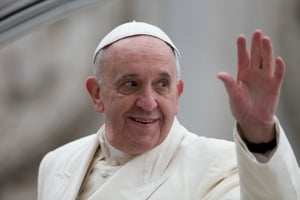A Vatican investigation of U.S. nuns started under the previous pope ended in Rome on Tuesday with the release of a report that acknowledged the achievements and the challenges the nuns face given their dwindling ranks.
The relatively warm tone in the report and at a Vatican news conference announcing its release was a far cry from six years ago when the investigation was announced. That announcement created fear, anger and mistrust among women in many religious communities and convents across the United States.
"Sorry, folks, this is not a controversial document," Mother M. Clare Millea, a U.S. nun who directed the investigation, said at the news conference. Instead, she said, it was "a challenge for all of us."
Pope Francis celebrated Mass on Tuesday with some of the women and men in religious orders who were involved with the long investigative process. Millea said Francis told them he knew it was an "arduous experience" and said of the nuns in the United States, "Please give them all my blessing."
The report said the orders were struggling to attract members. It found that there are now about 50,000 nuns in the United States, a decline of 125,000 from the peak in the mid-1960s. The median age of U.S. nuns is now in the mid- to late 70s.
The investigation, known as an apostolic visitation, was initiated in 2008 under Pope Benedict XVI with only a vague explanation. Cardinal Franc Rode, the head of the Vatican office for religious orders, said then that the purpose was to examine "the quality of life of religious women in the United States."
The Vatican usually orders an apostolic visitation of a specific entity in the case of a serious problem or scandal, but there was no clear event or cause in this situation. Rode later said he was concerned about "a certain secular mentality that has spread in these religious families and, perhaps, also a certain feminist spirit."
About 350 communities of religious women were sent questionnaires asking about such things as their numbers, mission, prayer schedules, living arrangements, financial assets and property. Nearly 80 investigators made on-site visits to 90 communities of nuns.
Some religious communities took umbrage at the investigation and did not cooperate fully. A few nuns said in interviews that their communities had decided to give the Vatican only a copy of their original founding constitutions.
The survey questions about property and finances led some nuns to suspect the Vatican could be assessing their communities' assets with an eye to appropriating them. The nuns were eventually told they did not have to answer the questions about finances, but the suspicions never fully faded.
The report acknowledged the resistance, saying the Vatican was "well aware that the apostolic visitation was met with apprehension and suspicion by some women religious" and that "the lack of full cooperation was a painful disappointment for us."
Other communities of nuns did cooperate and said that the process was an opportunity to reflect on whether they were living in accord with their founding constitutions and missions.
The report released in Rome on Tuesday covers one of the two investigations of U.S. nuns undertaken by the Vatican in recent years.
The other is a review of the Leadership Conference of Women Religious, an umbrella group representing about 80 percent of U.S. nuns. The Vatican accused that group of hosting speakers and issuing materials that strayed from Catholic doctrine. In 2012, it put the group under the oversight of a U.S. bishop for a thorough review -- a process expected to last five years.
The two investigations caused an uproar among some Catholics who picketed in front of parishes and cathedrals across the country.
Rode was replaced as head of the Vatican's office on religious orders, and the report was finished in 2012 under Cardinal Joao Braz de Aviz, who said he wanted to "rebuild trust" with the nuns.
Francis, who was elected last year, has said repeatedly that he wants to create more opportunities for women to have decision-making roles in the Vatican and in church leadership.
A Section on 12/17/2014
